“EU lawmakers must not allow vested interests from the gas industry to blow up this last opportunity to strengthen the gas package and lay solid grounds for a real fossil gas phaseout by 2035” – Esther Bollendorff, Senior Gas Policy Expert

During 2023, CAN Europe actively worked to influence two gas related legislative processes: the gas package and the methane regulation.
CAN Europe’s joint work within a vocal coalition resulted in a framework to tackle methane emissions from imported energy sources included in the methane regulation. This framework aims to close the gap that was missing from the Commission’s initial proposal, which effectively omitted oil and gas imports from the methane regulation. As most methane emissions occur at the extraction stage, it was important to close this loophole, especially given that the EU import rates for oil and gas is more than 80%. While the framework falls short on the fact that implementation will only happen in 2030 and there are missing mitigation measures, it is a critical first step in the right direction.
In the gas package CAN Europe successfully pushed for the inclusion of a clause which obliges gas distributors to publish their network decommissioning plans; a first step toward a specific gas phase-out pathway. A second victory in the gas arena was fighting back against the gas industry’s push to pass responsibility for future hydrogen network planning to fossil fuel gas operators only, creating an obvious conflict of interest. However the process has been safeguarded with the creation of an independent entity, the European Network of Network Operators for Hydrogen (ENNOH).
CAN Europe used 2023 to strengthen the network position on our demand to the EU to phase out gas by 2035. By drafting and publishing a ten-point-plan to phase out gas, there is now a policy tool, combined with a contextualisation blog which are both being used to influence the drafting of political parties’ manifestos in the lead up to the 2024 EU elections.
